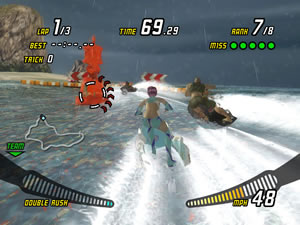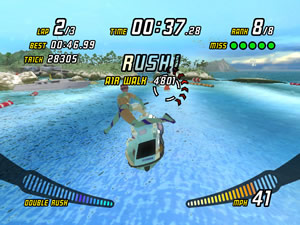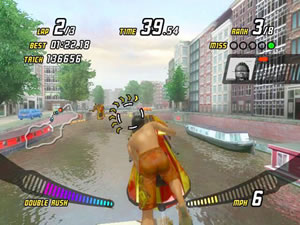A watered-down ride.
Hauling ass over something as mercurial as water is a strange sensation. It’s not steady like the road and can be harder than concrete, yet we can also float in and on top of it. As a result, you feel a little on edge on a jet-ski. The coolest moments undoubtedly come when seemingly suspended reality catches up with you; you cut a vicious turn going forty and are snatched by inertia from the machine and tossed, cart-wheeling into the sea. It can be a lot of fun.
However, I’m hard pressed to say the same about Carve, a thoroughly mediocre game that thoroughly deserves its spot in the bargain bin.
Carve is about as bare bones a jet-ski racer as you’ll ever
find. You can pick from one of eight racers, none of whom have any personality
or back story, and race in Quick-Races, Tournaments, an Arcade Mode, or online
against any of Carve‘s thousands of rabid fans (gently now,
remove tongue from cheek). There’s also a decent tutorial that quickly gets you
up to speed on Carve‘s trick system.
There
are five circuits with approximately five races apiece. Each race takes place
in one of four regions (Arctic, Europe, Pacific and USA), and the tracks become
steadily more complex as you advance through the circuits. They do not, however,
become more diverse, as they’re all just variations on the same handful of schemes.
While I’m sure this saved the developers lots of time and money, it seems hardly
accurate to say that there are 27 distinct tracks in Carve, as
the instruction booklet purports. There are several variations on four themes.
I’d
go with, oh, 12 tracks at best.
Carve‘s trick/boost system is far from original. Whenever you
bust a trick, you receive a boost that kicks in immediately after your trick
is finished. Bigger tricks warrant more boost, and eventually busting the same
trick over and over will exhaust that trick’s boost earning potential. Plus,
the trick selection is extremely slim, with only a handful of aerial tricks and
about three tricks to perform while in the water.
When you bust enough tricks, your ‘Rush’ meter fills up and by pressing the L
button you can launch into a super-extended boost called a Double-Rush. However,
turning is problematic in this state, and if you crash its effects are negated.
Generally speaking (place tongue back in cheek), I liked Carve‘s
system much more when it was called SSX.
In a cool touch, Carve includes the ability to torpedo. When you’re falling after a large jump, you can tip the nose of your craft seaward and enter the water to lunge out again, sort of like a dolphin. While submerged, you can enter a trick command that your player will execute upon surfacing, thus linking tricks for a combo. The ability to link tricks this way creates a far greater variety of trick sequences, which is crucial for a game with so few tricks.
 But
But
further complicating matters is the fact that there are red and yellow buoys
strewn throughout the courses. Yellow buoys must be passed on the left, red on
the right. Each time you miss a buoy you have three fewer seconds to complete
a lap, and if you miss five you’re
disqualified. Sometimes nailing these buoys will take you out of your way, and
so calculated misses can become veritable shortcuts. It can be irritating, for
instance, to take two shortcuts and wind up missing three buoys. Sort of takes
the fun out of finding shortcuts in the first place.
Another interesting feature is the ‘wake’ feature. If you ride directly behind another player, you’ll get caught in their wake and your speed will diminish drastically. This can be a huge pain in the ass, especially if you’re in last place and the entire pack is huddled together right in front of you. Eventually though, you will realize that boost absolutely negates this effect and will learn to do water tricks to get yourself out of these situations.
The biggest problem with Carve, though, is its lack of speed
and big jumps. It’s too slow and too tame for its own good, ultimately leading
to a flat gameplay experience.
Even though Carve is an Xbox game, it doesn’t look like one. The colors are a bit washed out, the animations are very limited, there are no interesting crashes, and water droplets, meant to be ambient, occasionally obscure an already low-res view. However, the frame-rate is quite solid, even if the game itself is generally quite slow.
 Carve‘s sounds aren’t impressive at all. Lame music, revving engines and the occasional “whoosh” of your craft entering the water constitute all there is to hear and not remember. Occasionally, another racer will chime in with some garbled non-sense, but it never matters.
Carve‘s sounds aren’t impressive at all. Lame music, revving engines and the occasional “whoosh” of your craft entering the water constitute all there is to hear and not remember. Occasionally, another racer will chime in with some garbled non-sense, but it never matters.
According to the documentation, Carve is actually a team game.
In this alternate-fictive dimension, the hot blonde girl is paired with the ugly
blonde guy, but as far as the game goes you’re on your own. If your team wins
and you lose, you still lose and cannot advance and there are no team play dynamics
whatsoever to any of the single-player modes.
Carve is playable online, and this is the only place in which team play actually means anything. You and another player are cosmically linked together so that missing buoys adversely affects both of you. It gives the game a little life, but not enough to warrant getting the game for its online play.
Still, you shouldn’t necessarily hit the kill switch on Carve before
giving it a chance, particularly since it retails for only $19.99. Yep, it’s
a bargain game. No, there’s nothing here that hasn’t
been done better before…but you get what you pay for.
-
Costs only 20 bucks
-
Playable online
-
Gets the basics right
-
Barely
-
Too slow
-
Not enough tricks
-
Annoying buoy system











